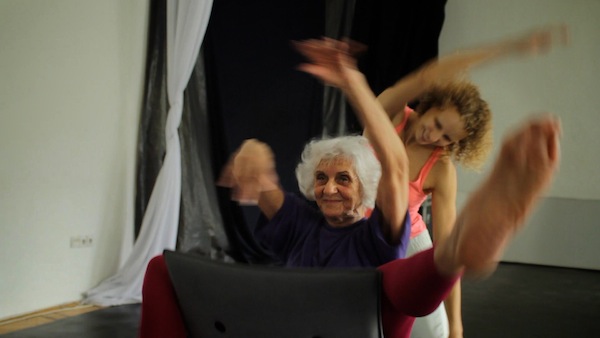Éva Fahidi, in front, and Emese Cuhorka in a still from The Euphoria of Being, directed and written by Réka Szabó.
Éva Fahidi was 18 years old when she and her family were taken to Auschwitz. The men and women were separated. The women’s selection committee cut the line after Fahidi: “I went one way, and my whole family the other way. It was over. We are talking about a fraction of a moment, when one didn’t even have the faintest idea of what was really happening.” Forty-nine members of her family were murdered, including her mother, father and sister.
Fahidi tells this part of her story as dancer Emese Cuhorka, covered from head to toe in a black leotard, moves around her, expressing with her body some of what Fahidi is expressing verbally. This is but one of many moving scenes in The Euphoria of Being, written and directed by Réka Szabó. The Jewish Independent has chosen to sponsor the documentary’s screening at this year’s Vancouver International Film Festival, which runs Sept. 26-Oct. 11.
Szabó had heard Fahidi give a talk in Berlin, and she had read Fahidi’s memoir, The Soul of Things. She wrote to Fahidi about wanting to make a performance about her, with her it in. The almost-90-year-old Hungarian Holocaust survivor responded positively: “Every person should possess some form of healthy exhibitionism,” she says in the film. “I have more than is needed, so I don’t have any excuses.”
Cuhorka reminds Szabó of Fahidi. From this resemblance came the concept of a duet. At one of the first rehearsals, Fahidi shows Cuhorka what she’s able to do physically. “And, from the outside, it is like seeing an entire life at once,” says Szabó, as she watches them move together.

The documentary covers the three-month period prior to the October première of what would become Sea Lavender. The work is the collaborative creation of the three women and, while what we are shown of the final result is powerful, it is the process and the bonds formed by the women that have the most impact, and give the film its inspirational quality.
Fahidi is remarkable. She is smart, spirited, well-spoken and endearing. When she talks about her Holocaust experiences, it is as if she is reliving them; her eyes look unfocused, her body appears heavier, her anger remains. She says her family should have left Hungary in 1935. “But my poor father, he couldn’t see beyond his nose,” she says. So proud was he of what he had built, he couldn’t leave it behind and only go with the clothes on his back. “This is the eternal tragedy,” she says, “that you don’t see things for what they are when you see them. Absolute idiocy.”
The film then cuts to a photo of the family – her parents, sister and her – as Fahidi describes the way in which she imagines them being gassed. She talks about a documentary she saw on Zyklon B, how it was first tried on geese. Such factual expositions lay raw the depth of her grief.
Yet, when Szabó asks Fahidi to list some of the things that helped her survive, Fahidi remarks that you have to appreciate and value the fact that you’re alive. “The fact that you exist, in itself, is euphoric,” she says. Hence, the name of the documentary and of the choice of “the flying chair duet” as the final scene of the performance. In discussing the nature of tragedy, Fahidi concludes that it’s no use thinking about it because you always end up in the same sad place. “Meanwhile,” she says, “you live happily.”
Seeing Cuhorka and Fahidi work and perform together is delightful – the two really do bear similarities, and their mutual respect is evident. The closing text of the film notes, “At the age of 93, Éva is still performing regularly. So far, we have staged 77 performances of Sea Lavender in numerous cities, such as Berlin, Budapest and Vienna.” While it is too much to hope that the show will come to North America, it is satisfying to know of the project’s life-changing effect on Fahidi, who, apparently, “can’t imagine being alive and not performing the piece anymore.”
The Euphoria of Being screens Sept. 27, 12:30 p.m., at International Village 8, and Oct. 3, 7 p.m., and Oct. 4, 10 a.m., at Vancity Theatre. For tickets, visit viff.org.

